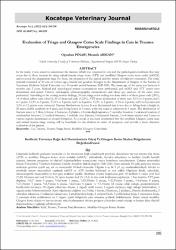Kedilerin travmaya bağlı acil durumlarında triyaj ve glasgow koma skalası bulgularının değerlendirmesi
Künye
Pınar, O. & Arıcan, M. (2022). Kedilerin Travmaya Bağlı Acil Durumlarında Triyaj Ve Glasgow Koma Skalası Bulgularının Değerlendirmesi . Kocatepe Veterinary Journal , 15 (3) , 285-296 . DOI: 10.30607/kvj.1063835Özet
Çalışmada kedilerde gözlenen travmalar ve bu travmalara bağlı oluşabilecek patolojik durumların hayvan travma triaj skoru (ATT) ve modifiye Glasgow koma skoru skalaları (mGCS) kullanılarak, önceden anlaşılması ve bunlara yönelik hazırlık aşaması, hastanın prognozu ve objektif değerlendirilme sonuçlarının ortaya konulması amaçlanmıştır. Çalışma materyalini Selçuk Üniversitesi Veteriner Fakültesi Cerrahi Anabilim Dalı Kliniği’ne 2020-2021 yılları arasında 10 aylık periyotta travma nedeniyle getirilen çeşitli yaş, ırk ve cinsiyetteki 30 kedi oluşturdu. Olgular 6 ay ile 2 yıl yaş ortalamalarındaydı. İskelet ve nörolojik sistem muayeneleri yapılarak mGCS ve ATT skorları belirlendi ve not edildi. Olguların klinik, radyolojik, ultrasonografik muayeneleri ve kan gazı analizleri yapıldı. Skorlama sistemi bulgularına göre 30 kedinin; 6 tanesi yeşil kod (%20) 14 tanesi sarı kod (%46.6), 10 tanesi kırmızı kod (% 33.3) ile triaj renk kodlaması yapılmıştır. Otuz kedinin ATT puan dağılımı; %3,3’ ünün 0 puana, %6,6’sının 1 puana, %23,3’ünün 2 puana, %33,3’ünün 3 puana, %6,6’sının 4 puana, %13,3’ünün 5 puana, %3,3’ünün 6 puana, %6,6’sının 8 puana ve %3,3’ünün 12 puana sahip olduğu gözlemlenmiştir. Kedilerdeki travmaya; 20 olguda yüksekten düşme, 4 olguda trafik kazası, 3 olguda ısırılmaya bağlı olduğu belirlenirken, 3 olguda neden bilinmemektedir. Kırık olgularının dağılımı ise; 3 tibia, 6 femur, 2 humerus, 2 phalanx, 2 hernia diyaframatika, 5 sakroiliak luksasyon, 1 kalkaneus luksasyonu, 2 antebrachium kırığı, 2 vertebral kırık, 1 çoklu koksa kırığı, 1 metatarsus kırığı, 2 yumuşak doku zedelenmesi ve 2 olguda çeşitli bölgelerde yara oluşumu şeklinde belirlenmiştir. Sonuç olarak modifiye Glasgow koma skalası ve hayvan travma triaj skorlamasının hekime prognoz yönünden yararlı olacağı ve hastayı daha objektif değerlendirmeyi sağladığı belirlenmiştir. In the study, it was aimed to understand the traumas which was observed in cats and the pathological conditions that may occur due to these traumas by using animal trauma triage score (ATT) and modified Glasgow coma score scales (mGCS), and to reveal the preparation stage for them, the prognosis of the patient and the results of objective evaluation. The study material consisted of 30 cats of various ages, breeds and genders, brought to the Department of Surgery of the Faculty of Veterinary Medicine Selçuk University in a 10-month period between 2020-2021. The mean age of the cases was between 6 months and 2 years. Skeletal and neurological system examinations were performed, and mGCS and ATT scores were determined and noted. Clinical, radiological, ultrasonographic examinations and blood gas analyzes of the cases were performed. According to the scoring system findings, 30 cats; triage color coding was done with 6 of them green code (20%), 14 of them yellow code (46,6%), 10 of them red code (33,3%). ATT score distribution of thirty cats; 3,3% to 0 points, 6,6% to 1 point, 23,3% to 2 points, 33,3% to 3 points, 6,6% to 4 points, 13,3% to 5 points, 3,3% to 6 points, 6,6% to 8 points and 3,3% to 12 points were observed. Trauma distributions in cats; It was determined that it was due to falling from a height in 20 cases, traffic accidents in 4 cases, and being bitten in 3 cases, while the cause is unknown in 3 cases. The distribution of fracture cases is; 3 tibia, 6 femur, 2 humerus, 2 phalanx, 2 hernia diaphragmatica, 5 sacroiliac luxation, 1 calcaneal luxation, 2 antebrachial fractures, 2 vertebral fractures, 1 multiple coxa fracture, 1 metatarsal fracture, 2 soft tissue injuries and 2 cases in various regions determined as wound formation. As a result, it has been determined that the modified Glasgow coma scale and animal trauma triage scoring will be beneficial for the clinician in terms of prognosis and provide a more objective evaluation of the patient.
Cilt
15Sayı
3Koleksiyonlar
- Cilt 15 : Sayı 3 [15]



















